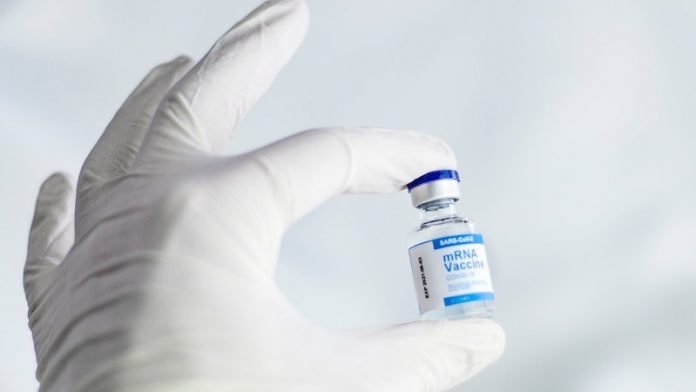
A new study from Cardiff University finds doctors have successfully used vaccination to treat a patient with COVID-19 in what is thought to be the first instance of the vaccine being used for therapy instead of prevention.
The study is published in the Journal of Clinical Immunology and was conducted by Professor Stephen Jolles et al.
Ian Lester, 37, a dispensing optician from Pontypridd who has a rare genetic immunodeficiency, tested positive for COVID-19 for seven and a half months after catching the virus.
The virus was finally cleared from his body after clinicians from the Immunodeficiency Centre for Wales used two doses of the Pfizer vaccine to treat him and scientists monitored his immune system’s response.
It suggests the vaccine successfully kick-started Mr. Lester’s immune system to clear the virus—and it is now hoped this approach could be used to treat other patients who are immune-compromised.
Mr. Lester has Wiskott-Aldrich Syndrome, a rare condition that causes immunodeficiency, so he has a dampened response to infection.
When he caught COVID-19 in December 2020, Mr. Lester was unable to fight off the virus and it was repeatedly detected for at least 218 days.
This is different from long COVID where the effects of infection may remain even after the virus has been cleared.
During this time, he suffered fluctuating symptoms of chest tightness, insomnia, headaches, poor concentration, and extreme fatigue and had to self-isolate for large parts of this time.
Given the persistent positive PCR tests and impact on his health and mental health, the team decided on a unique therapeutic approach.
They wondered whether therapeutic vaccination could help in finally clearing the virus by inducing a strong immune response within the body.
The team administered two doses of the BioNTech Pfizer vaccine, one month apart, and very quickly saw a strong antibody response, much stronger than had been induced by the prolonged natural infection.
Researchers also saw a strong T-cell response—the arm of the immune system thought to be crucial to fighting off the virus.
They found SARS-CoV-2 clearance was finally confirmed 72 days after the first vaccination dose and 218 days since it was first detected.
This is the first time mRNA vaccination has been used to clear persistent COVID-19 infection. Importantly, the vaccine was well tolerated by the patient and successfully induced a strong antibody and T-cell response.
This was remarkable given Ian’s response to conventional vaccinations in the past has been extremely limited.
The team says scientists will need to reproduce this work to confirm the link and see if it can be used in other cases.
The study is the first to highlight the exciting potential for it to be used as a treatment in persistent infection.
A recent study has found these two things can reduce the Pfizer vaccine’s effectiveness, which is highly relevant to the current study.
A previous study from Rush University and published in JAMA Network Open found that people who know they were infected with SARS-CoV-2 in the past may need only one shot of the Pfizer vaccine to gain strong immunity.
They found higher SARS-CoV-2 antibody levels in previously infected individuals after 1 dose of the Pfizer vaccine, compared with uninfected individuals after 2 doses.
What’s more, giving previously infected people a second dose of the Pfizer vaccine did little to boost their antibody levels further.
In the study, the team tested 29 Chicago-area residents with a prior case of COVID-19 infection based on PCR testing and another group of 30 people with no such histories. Participants averaged 42 years of age, and about three-quarters were women.
The study highlighted that prior infection alone is not a robust defense against COVID-19.
Before vaccination, the unit in blood samples for antibodies against SARS-CoV-2 in people who’d previously had COVID was about 621. After one dose of the Pfizer vaccine, that level soared to a much more protective level of 30,000 AU/mL.
Adding in the second dose of the vaccine only nudged that number up slightly higher, to about 37,000 AU/mL.
For people who had never encountered SARS-CoV-2 before, two vaccine doses were definitely needed to reach a good level of protective antibodies.
After one dose, this group’s antibodies averaged just over 1,800 AU/mL in blood samples, but after getting a second dose that number jumped to more than 15,000 AU/mL.
The team says while two doses of the Pfizer vaccine are essential if you’ve never had COVID-19, one dose may be enough if you’ve already had it.
Sign up for our newsletter for more information about this topic.
If you care about COVID, please read studies about people who are more likely to get severe COVID-19 after vaccination, and findings of existing drugs that can prevent COVID death.
For more information about COVID, please see recent studies about the cause of severe disease and death in COVID-19, and results showing scientists find new antibody treatment for COVID-19.
Copyright © 2022 Knowridge Science Report. All rights reserved.



